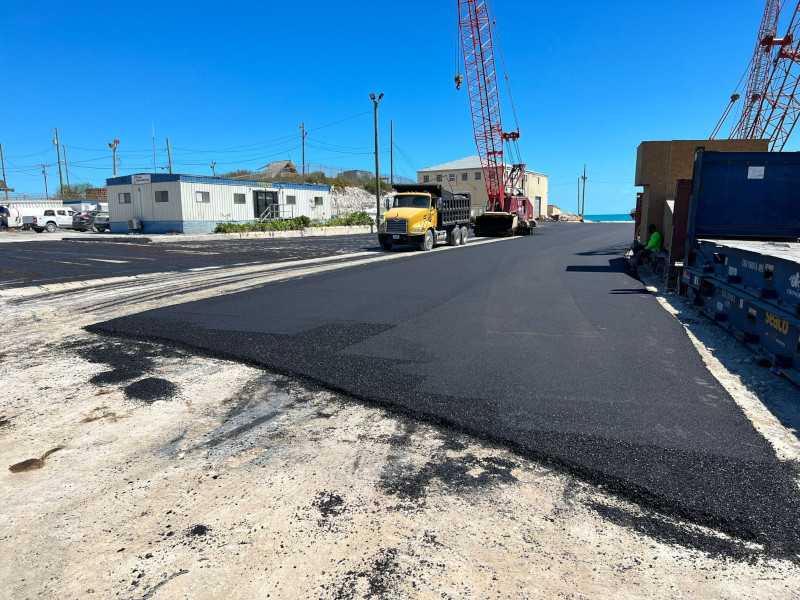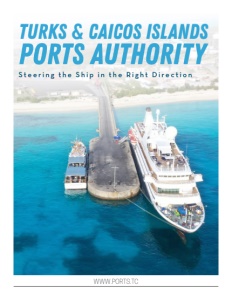Turks and Caicos Islands Ports Authority
steering the ship in the right direction
With the shipping industry in mind, the Turks and Caicos Islands Ports Authority ensures clear sailing
The Turks and Caicos Islands, an archipelago in the Atlantic Ocean, boasts a thriving marine industry that plays a significant role in the nation’s economy. At the heart of this marine ecosystem are the Turks and Caicos Islands Ports Authority (TCIPA), which is responsible for managing the government’s ports and ensuring good order in the territorial and internal waters of the islands.
Delton Jones, Managing Director of TCIPA, sheds light on the organization’s history, explaining that it was established as a government statutory body in 2008. Prior to its formation, the government managed the ports through the customs department, which later evolved into a separate government cost center known as the port administration. A similar pattern of evolution can be observed in many Caribbean nations.
Today, the Ports Authority manages four government ports, carrying out all essential port responsibilities, such as safety, security, and staffing. The organization works within the government’s regulatory framework and partners with several government entities to ensure environmental and pollution requirements compliance. The only private port in the area, the Carnival Cruise Corporation Port Grand Cruise Center, is not part of TCIPA’s remit.
Tueton Williams, Chairman of the board at TCIPA, emphasizes the importance of adhering to environmental regulations, stating that the organization is “absolutely” committed to working closely with the government to maintain high standards.
Over the years, the TCIPA has adapted to the changing landscape of the marine industry while maintaining its core mandate. Jones emphasizes that their responsibilities have evolved, saying,
“It’s not just port management, but supply chain efficiency, the changing international security landscape, climate change, and other considerations.”
Historically, the focus of the Ports Authority was primarily on ensuring the safe delivery of cargo, which in the past was mainly bulk. However, as the shipping environment transitioned to containerization, TCIPA has had to adapt and expand its scope to address emerging challenges and opportunities.
Moreover, Jones highlights the need to become “less insular,” considering the interests of stakeholders and the impact of activities on the community, including how operations affect residents’ living costs.
Operationally, the TCIPA oversees a comprehensive range of operations across four ports, employing a workforce of approximately fifty-eight. Each port serves a distinct purpose and clientele, contributing to the overall efficiency and effectiveness of the marine industry in the islands.
The four ports managed by TCIPA are located in Grand Turk, the capital of the Turks and Caicos Islands; South Caicos; Providenciales; and North Caicos.

Williams explains that these ports serve different functions, with three, Providenciales, Grand Turk, and South Caicos, primarily handling cargo and North Caicos geared more towards the tourism industry and transporting passengers between Providenciales and North Caicos.
The diverse portfolio of ports managed by TCIPA showcases the organization’s ability to cater to various aspects of the marine industry, from cargo transportation to tourism. By providing tailored services at each location, the Ports Authority is well-positioned to meet the needs of business owners and leaders, contributing to the ongoing growth and success of the Turks and Caicos Islands.
The customer base of the TCIPA is highly concentrated. According to Jones, the two predominant international shipping lines serving the port in Grand Turk and Providenciales are Tropical Shipping and Seacor Island Lines. Additionally, smaller barges and vessels arrive from neighboring countries, contributing to the overall flow of goods and services.
TCIPA’s concentrated customer base also includes key players in the import sector, with a few prominent companies and agents handling imported materials for the construction industry. These primary stakeholders, such as Building Materials Limited, Butterfield Gold LTD and CBMS Limited, ensure that goods reach their intended destinations promptly and efficiently.
As a national monopoly, TCIPA works diligently to ensure that its ports operate as efficiently as possible to support the needs of these critical stakeholders. This focus on efficiency benefits the entire community, enabling shipping lines and agents to provide their services effectively and facilitating trade and commerce throughout the Turks and Caicos Islands.
The COVID-19 pandemic presented unique challenges to businesses across the globe, including the TCIPA. Jones admits that the unprecedented nature of the pandemic meant there was no existing playbook to follow. He emphasized the need for flexibility and adaptability in these trying times, saying, “We had to think on our feet.”
As an essential service, TCIPA maintained its operations throughout the pandemic, ensuring that crucial supplies continued to reach the islands. The organization faced numerous obstacles, from stigmatizing the international shipping sector to fear and trepidation about the virus. Jones stressed the importance of overcoming these challenges to guarantee the
TCIPA’s focus on staff well-being and education played a crucial role in ensuring the success of its operations during the pandemic. Jones shared, “We brought medical doctors to talk to shipping stakeholders about the need for protection and vaccination.” Although some staff members contracted COVID-19, Jones confirmed no fatalities, and the organization managed the situation well.
With its clear mandate of facilitating trade and ensuring the region’s marine industry’s growth, the TCIPA has embarked on an ambitious infrastructure development plan, investing approximately $60 million into upgrading its main port facility in Providenciales.
Williams shares that the organization is at the beginning stages of this massive project, which will significantly enhance the port’s capabilities and efficiency.
“In the past three years, TCIPA has focused on developing smaller ports, including refurbishments in Grand Turk and South Caicos, and the completion of the North Caicos port,” he says. “Now, the attention has shifted to Providenciales, the main port in the archipelago.”

“One notable development is the construction of a new staff building, which will accommodate TCIPA’s personnel and other agencies. Groundbreaking on this facility took place in late 2022.”
A vital element of the upgrade plan is to expand the port’s docking capacity. Currently, the port can manage only one ship at a time. However, adding two new docking areas will enable the simultaneous offloading of three boats. Additional dredging, new lighting, and a designated
Recognizing the importance of environmental protection, TCIPA will implement a safe water drainage system.
The Providenciales port has not seen any significant upgrades since its inception. This new development project aims to transform the facility, ensuring its viability for 15 to 20 years.
In addition to the significant infrastructure developments detailed by Williams, Jones elaborates on the broader scope of the project, emphasizing the importance of staff development, modernizing systems and procedures, and fostering an efficient, interconnected port system across the islands.
“We want to transform the main port in Providenciales over the next 2 to 3 years, with the ultimate goal of establishing an efficient, interconnected port system connecting Provo, North Caicos, South Caicos, and Grand Turk within 4 to 5 years.”
To prepare the staff for upcoming changes and opportunities, TCIPA is embarking on a restructuring exercise designed to shape the organizational culture for the future. Additionally, TCIPA is working closely with the Port Management Association of the Caribbean to introduce a new digital data platform. This innovative tool will help the organization better measure and account for revenue, develop statistics, and track port performance indicators.
Jones adds, “We are using a multipronged approach that includes infrastructure, staff development, and new systems and procedures to create a modern port environment that will serve the Turks and Caicos for the next 15 to 20 years.”
As the TCIPA moves forward with its ambitious plans for 2023 and beyond, Jones acknowledges the challenges ahead. The $60 million redevelopment of Providenciales’ main port is a significant undertaking. However, ensuring minimal disruption to the supply chain and port users while keeping the port open during construction will require excellent communication and coordination.
Jones remarks on the significance of these efforts, stating, “The next 3 to 4 years will turn the port into one big construction site.”
TCIPA Williams also points out the broader implications of the port redevelopment project, emphasizing its potential to bring down the cost of living for residents and businesses in the Turks and Caicos Islands. As most produce and goods are imported, the improvements in shipping schedules and the ability to accommodate larger vessels could result in lower consumer prices.
“This development will bring the cost of living down, which would significantly benefit not only the businesses but the citizens of Turks and Caicos Islands.”
The extensive plans for redevelopment and modernization of the ports signify progress and highlight the agency’s commitment to enhancing the quality of life and economic growth in the Turks and Caicos Islands.
AT A GLANCE
Turks and Caicos Islands Ports Authority
What: The overseeing body that ensures the smooth operations of the ports and shipping sector
Where: Grand Turk in the Caribbean region
Website: https://www.ports.tc/
PREFERRED VENDORS
Rubis – www.rubiscaymanislands.com
RUBiS is a leading supplier of premium fuels in The Turks & Caicos Islands with 9 service stations across two islands and a large aviation presence at Providenciales International Airport since 2012. Our goal is to continue to be the preferred fuel brand of choice. We offer innovative and flexible solutions that have transformed the fuel industry and we are committed to providing exceptional service to our valued customers. Visit our website today to learn more! www.rubis-turksandcaicos.com
Digicel Group – www.digicelgroup.com






 This information will never be shared to third parties
This information will never be shared to third parties